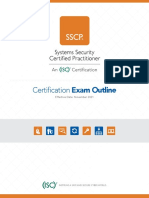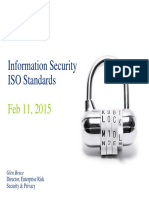ISSMP Exam Outline Effective May 2018
ISSMP Exam Outline Effective May 2018
Uploaded by
learyCopyright:
Available Formats
ISSMP Exam Outline Effective May 2018
ISSMP Exam Outline Effective May 2018
Uploaded by
learyOriginal Title
Copyright
Available Formats
Share this document
Did you find this document useful?
Is this content inappropriate?
Copyright:
Available Formats
ISSMP Exam Outline Effective May 2018
ISSMP Exam Outline Effective May 2018
Uploaded by
learyCopyright:
Available Formats
Certification Exam Outline
Effective Date: May 2018
About CISSP-ISSMP
The Information Systems Security Management Professional (ISSMP) is a CISSP who specializes in establishing,
presenting, and governing information security programs, and demonstrates management and leadership
skills. ISSMPs direct the alignment of security programs with the organization’s mission, goals, and strategies
in order to meet enterprise financial and operational requirements in support of its desired risk position.
The broad spectrum of topics included in the ISSMP Common Body of Knowledge (CBK) ensure its relevancy
across all disciplines in the field of information security management. Successful candidates are competent in
the following 6 domains:
• Leadership and Business Management
• Systems Lifecycle Management
• Risk Management
• Threat Intelligence and Incident Management
• Contingency Management
• Law, Ethics, and Security Compliance Management
Experience Requirements
Candidates must be a CISSP in good standing and have 2 years cumulative paid work experience
in 1 or more of the 6 domains of the CISSP-ISSMP CBK. You can learn more about CISSP-ISSMP
experience requirements and how to account for part-time work and internships at
www.isc2.org/Certifications/CISSP-ISSMP/experience-requirements.
Accreditation
ISSMP is in compliance with the stringent requirements of ANSI/ISO/IEC Standard 17024.
Job Task Analysis (JTA)
(ISC)² has an obligation to its membership to maintain the relevancy of the ISSMP. Conducted at regular
intervals, the Job Task Analysis (JTA) is a methodical and critical process of determining the tasks that are
performed by security professionals who are engaged in the profession defined by the ISSMP. The results of
the JTA are used to update the examination. This process ensures that candidates are tested on the topic
areas relevant to the roles and responsibilities of today’s practicing information security professionals.
ISSMP Certification Exam Outline 2
CISSP-ISSMP Examination Information
Length of exam 3 hours
Number of items 125
Item format Multiple choice
Passing grade 700 out of 1000 points
Exam availability English
Testing center Pearson VUE Testing Center
CISSP-ISSMP Examination Weights
Domains Weight
1. Leadership and Business Management 22%
2. Systems Lifecycle Management 19%
3. Risk Management 18%
4. Threat Intelligence and Incident Management 17%
5. Contingency Management 10%
6. Law, Ethics, and Security Compliance Management 14%
Total: 100%
ISSMP Certification Exam Outline 3
Domain 1:
Leadership and Business Management
1.1 Establish Security’s Role in Organizational Culture, Vision, and Mission
» Define information security program vision and mission
» Align security with organizational goals, objectives, and values
» Explain business processes and their relationships
» Describe the relationship between organizational culture and security
1.2 Align Security Program with Organizational Governance
» Identify and navigate organizational governance structure
» Recognize roles of key stakeholders
» Recognize sources and boundaries of authorization
» Negotiate organizational support for security initiatives
1.3 Define and Implement Information Security Strategies
» Identify security requirements from business initiatives
» Evaluate capacity and capability to implement security strategies
» Manage implementation of security strategies
» Review and maintain security strategies
» Describe security engineering theories, concepts, and methods
1.4 Define and Maintain Security Policy Framework
» Determine applicable external standards » Develop procedures, standards, guidelines, and
baselines
» Manage data classification
» Ensure periodic review of security policy
» Establish internal policies
framework
» Obtain organizational support for policies
1.5 Manage Security Requirements in Contracts and Agreements
» Evaluate service management agreements » Manage impact of organizational change (e.g.,
(e.g., risk, financial) mergers and acquisitions, outsourcing)
» Govern managed services (e.g., infrastructure, » Monitor and enforce compliance with contractual
cloud services) agreements
ISSMP Certification Exam Outline 4
1.6 Oversee Security Awareness and Training Programs
» Promote security programs to key stakeholders
» Identify training needs by target segment
» Monitor and report on effectiveness of security awareness and training programs
1.7 Define, Measure, and Report Security Metrics
» Identify Key Performance Indicators (KPI)
» Relate KPIs to the risk position of the organization
» Use metrics to drive security program development and operations
1.8 Prepare, Obtain, and Administer Security Budget
» Manage and report financial responsibilities
» Prepare and secure annual budget
» Adjust budget based on evolving risks
1.9 Manage Security Programs
» Build cross-functional relationships » Resolve conflicts between security and other
stakeholders
» Identify communication bottlenecks and barriers
» Determine and manage team accountability
» Define roles and responsibilities
1.10 Apply Product Development and Project Management Principles
» Describe project lifecycle
» Identify and apply appropriate project management methodology
» Analyze time, scope, and cost relationship
ISSMP Certification Exam Outline 5
Domain 2:
Systems Lifecycle Management
2.1 Manage Integration of Security into System Development Lifecycle (SDLC)
» Integrate information security gates (decision points) and milestones into lifecycle
» Implement security controls into system lifecycle
» Oversee configuration management processes
2.2 Integrate New Business Initiatives and Emerging Technologies into the Security
Architecture
» Participate in development of business case for new initiatives to integrate security
» Address impact of new business initiatives on security
2.3 Define and Oversee Comprehensive Vulnerability Management Programs (e.g.,
vulnerability scanning, penetration testing, threat analysis)
» Classify assets, systems, and services based on criticality to business
» Prioritize threats and vulnerabilities
» Oversee security testing
» Mitigate or remediate vulnerabilities based on risk
2.4 Manage Security Aspects of Change Control
» Integrate security requirements with change control process
» Identify stakeholders
» Oversee documentation and tracking
» Ensure policy compliance
ISSMP Certification Exam Outline 6
Domain 3:
Risk Management
3.1 Develop and Manage a Risk Management Program
» Communicate risk management objectives with » Determine the impact and likelihood of threats
risk owners and other stakeholders and vulnerabilities
» Understand principles for defining risk tolerance » Determine countermeasures, compensating and
mitigating controls
» Determine scope of organizational risk program
» Recommend risk treatment options and when to
» Obtain and verify organizational asset inventory
apply them
» Analyze organizational risk management
requirements
3.2 Conduct Risk Assessments (RA)
» Identify risk factors » Manage risk exceptions
» Manage supplier, vendor, and third-party risk » Monitor and report on risk
» Understand supply chain security management » Perform cost–benefit analysis
» Conduct Business Impact Analysis (BIA)
ISSMP Certification Exam Outline 7
Domain 4:
Threat Intelligence and Incident
Management
4.1 Establish and Maintain Threat Intelligence Program
» Synthesize relevant data from multiple threat » Conduct threat modeling
intelligence sources » Identify ongoing attacks
» Conduct baseline analysis » Correlate related attacks
» Review anomalous behavior patterns for
» Create actionable alerting to appropriate
potential concerns resources
4.2 Establish and Maintain Incident Handling and Investigation Program
» Develop program documentation » Establish and maintain incident handling process
» Establish incident response case management » Establish and maintain investigation process
process » Quantify and report financial and operational
» Establish Incident Response Team (IRT) impact of incidents and investigations to
stakeholders
» Understand and apply incident management
methodologies » Conduct Root Cause Analysis (RCA)
ISSMP Certification Exam Outline 8
Domain 5:
Contingency Management
5.1 Oversee Development of Contingency Plans (CP)
» Analyze challenges related to the Business » Define internal and external incident
Continuity (BC) process (e.g., time, resources, communications plans
verification) » Define incident roles and responsibilities
» Analyze challenges related to the Disaster » Determine organizational drivers and policies
Recovery (DR) process (e.g., time, resources,
verification) » Reference Business Impact Analysis (BIA)
» Analyze challenges related to the Continuity of » Manage third-party dependencies
Operations Plan (COOP) » Prepare security management succession plan
» Coordinate with key stakeholders
5.2 Guide Development of Recovery Strategies
» Identify and analyze alternatives
» Recommend and coordinate recovery strategies
» Assign recovery roles and responsibilities
5.3 Maintain Business Continuity Plan (BCP), Continuity of Operations Plan (COOP), and
Disaster Recovery Plan (DRP)
» Plan testing, evaluation, and modification
» Determine survivability and resiliency capabilities
» Manage plan update process
5.4 Manage Recovery Process
» Declare disaster » Gather lessons learned
» Implement plan » Update plan based on lessons learned
» Restore normal operations
ISSMP Certification Exam Outline 9
Domain 6:
Law, Ethics, and Security Compliance
Management
6.1 Understand the Impact of Laws that Relate to Information Security
» Understand global privacy laws » Understand intellectual property laws
» Understand legal jurisdictions the organization » Understand industry regulations affecting the
operates within (e.g., trans-border data flow) organization
» Understand export laws » Advise on potential liabilities
6.2 Understand Management Issues as Related to the (ISC)2 Code of Ethics
6.3 Validate Compliance in Accordance with Applicable Laws, Regulations, and Industry Best
Practices
» Obtain leadership buy-in » Define and utilize security compliance metrics to
report control effectiveness and potential areas
» Select compliance framework(s)
of improvement
» Implement validation procedures outlined in
framework(s)
6.4 Coordinate with Auditors, and Assist with the Internal and External Audit Process
» Prepare » Formulate response
» Schedule » Validate implemented mitigation and
remediation actions
» Perform audit
» Evaluate findings
6.5 Document and Manage Compliance Exceptions
ISSMP Certification Exam Outline 10
Additional Examination Information
Supplementary References
Candidates are encouraged to supplement their education and experience by reviewing
relevant resources that pertain to the CBK and identifying areas of study that may need
additional attention.
View the full list of supplementary references at www.isc2.org/certifications/References.
Examination Policies and Procedures
(ISC)² recommends that ISSMP candidates review exam policies and procedures prior to
registering for the examination. Read the comprehensive breakdown of this important
information at www.isc2.org/Register-for-Exam.
Legal Info
For any questions related to (ISC)²’s legal policies, please contact the (ISC)2 Legal
Department at legal@isc2.org.
Any Questions?
(ISC)² Candidate Services
311 Park Place Blvd, Suite 400
Clearwater, FL 33759
(ISC)² Americas
Tel: +1.866.331.ISC2 (4722)
Email: info@isc2.org
(ISC)² Asia Pacific
Tel: +(852) 28506951
Email: isc2asia@isc2.org
(ISC)² EMEA
Tel: +44 (0)203 300 1625
Email: info-emea@isc2.org
ISSMP Certification
v720 Exam Outline 11
You might also like
- CGRC Exam OutlineDocument11 pagesCGRC Exam OutlineAtinuke OweteNo ratings yet
- Cockney Dialect and SlangDocument28 pagesCockney Dialect and SlangPaula Perez100% (1)
- Internship ReportDocument61 pagesInternship ReportTahmina AhanaNo ratings yet
- The Method of CorrelationDocument2 pagesThe Method of CorrelationCarlo EmilNo ratings yet
- Shouldice HospitalDocument7 pagesShouldice HospitalGB GastecNo ratings yet
- CISSP ISSMP Exam Outline November 2022 EnglishDocument11 pagesCISSP ISSMP Exam Outline November 2022 EnglishDimitris KolettisNo ratings yet
- ISSMP Exam Outline November 2023 EnglishDocument11 pagesISSMP Exam Outline November 2023 EnglishguesieroNo ratings yet
- ISSMP Exam Outline Effective May 2018Document11 pagesISSMP Exam Outline Effective May 2018Zeeshan RanaNo ratings yet
- CISSP Exam Outline PDFDocument15 pagesCISSP Exam Outline PDFsriNo ratings yet
- Certification: Exam OutlineDocument15 pagesCertification: Exam Outlinejustforfun2009No ratings yet
- CISSP Exam Outline English April 2021 PDFDocument16 pagesCISSP Exam Outline English April 2021 PDFKevin MonkamNo ratings yet
- CAP Exam OutlineDocument10 pagesCAP Exam OutlineironmanNo ratings yet
- CAP Exam OutlineDocument12 pagesCAP Exam OutlineHyder BasetNo ratings yet
- CISSP Exam Outline-V1115Document16 pagesCISSP Exam Outline-V1115AsadMalikNo ratings yet
- SSCP Exam OutlineDocument11 pagesSSCP Exam Outlineironman100% (1)
- CGRC Exam Outline November 2023 EnglishDocument11 pagesCGRC Exam Outline November 2023 Englishedson atuhaireNo ratings yet
- Cyber Security Risk Mitigation ChecklistDocument33 pagesCyber Security Risk Mitigation ChecklistuiuiuiuNo ratings yet
- Security Industry Specific KnowledgeDocument188 pagesSecurity Industry Specific KnowledgeMohammed Irfan100% (1)
- CISSP Exam Outline April 2024 EnglishDocument15 pagesCISSP Exam Outline April 2024 EnglishBratu MadalinNo ratings yet
- CCISO New Blueprint v2Document12 pagesCCISO New Blueprint v2carlosaugustosanchezmNo ratings yet
- CisspDocument16 pagesCisspRyan GlasgowNo ratings yet
- SSCP Exam Outline Sept17Document13 pagesSSCP Exam Outline Sept17halakahiki82No ratings yet
- Chapter 5 - Risk ManagementDocument66 pagesChapter 5 - Risk ManagementVako VeiiNo ratings yet
- MCMC ISO STANDARD Information Security Management SystemDocument4 pagesMCMC ISO STANDARD Information Security Management SystemseanNo ratings yet
- Iso 27001Document43 pagesIso 27001SRISHTI MALHOTRA100% (1)
- BITS3523 - Information Security Management System (ISMS) PART BDocument15 pagesBITS3523 - Information Security Management System (ISMS) PART BDANIAL IRFANNo ratings yet
- Cyber Boot Camp - Day 05 - Cyber Security FrameworkDocument3 pagesCyber Boot Camp - Day 05 - Cyber Security FrameworkAnna Margarita de VegaNo ratings yet
- CISM Domain 1 Update 3 New FormatDocument95 pagesCISM Domain 1 Update 3 New Formatmrsph07No ratings yet
- 1) Overview of The Cybersecurity FrameworkDocument4 pages1) Overview of The Cybersecurity FrameworkArunim AichNo ratings yet
- 008 PSMDocument21 pages008 PSMniels.cauwenberghNo ratings yet
- Integrating Kris and Kpis For Effective Technology Risk ManagementDocument5 pagesIntegrating Kris and Kpis For Effective Technology Risk ManagementMaya M100% (2)
- ISO 27011 Information Security ChecklistDocument4 pagesISO 27011 Information Security ChecklistAnis GharbiNo ratings yet
- Iso 27001Document100 pagesIso 27001Marek Sulich100% (1)
- Isaca: Trust In, and Value From, Information SystemsDocument100 pagesIsaca: Trust In, and Value From, Information SystemsMansoor AhmedNo ratings yet
- MPA Content Security Best Practices v5.2 Aug30 2023 ReleaseDocument88 pagesMPA Content Security Best Practices v5.2 Aug30 2023 ReleasesachadelaplayaNo ratings yet
- 3 How To Use The CSF Profile For CVEDocument21 pages3 How To Use The CSF Profile For CVEFerry AstikaNo ratings yet
- CRISC Job Practice Areas 2015Document4 pagesCRISC Job Practice Areas 2015SpipparisNo ratings yet
- CSE 6203 - Lecture 01Document18 pagesCSE 6203 - Lecture 01Sumit PramanikNo ratings yet
- TCLG Information Security ISO Standards Feb 2015 PDFDocument28 pagesTCLG Information Security ISO Standards Feb 2015 PDFChristian AquinoNo ratings yet
- BCLE 2000C PG 02 Jan2019Document26 pagesBCLE 2000C PG 02 Jan2019myturtle gameNo ratings yet
- Summary of ch14+ch15Document20 pagesSummary of ch14+ch15saraNo ratings yet
- ERM - PrezDocument75 pagesERM - PrezatiqNo ratings yet
- Karen Scarfone Scarfone CybersecurityDocument34 pagesKaren Scarfone Scarfone CybersecurityAbdulkadir YÜKSELNo ratings yet
- 2 WeekDocument37 pages2 WeekWisam Makki AlwashNo ratings yet
- Cissp d1 SlidesDocument123 pagesCissp d1 SlidesspgethicalNo ratings yet
- ISO IEC 27001 2022 Transition SELF EVALUATION CHECKLIST ISO - IEC 27001 - 2022Document19 pagesISO IEC 27001 2022 Transition SELF EVALUATION CHECKLIST ISO - IEC 27001 - 2022isosmibNo ratings yet
- InfoSec Framework - Presentation by HicksDocument14 pagesInfoSec Framework - Presentation by HickskhannashriyaNo ratings yet
- CISSP - 1 Information Security & Risk ManagementDocument60 pagesCISSP - 1 Information Security & Risk Managementjonty509No ratings yet
- CISM Domain 1 Update 2 New FormatDocument94 pagesCISM Domain 1 Update 2 New Formatmrsph07No ratings yet
- Unit 2Document61 pagesUnit 2KhushiNo ratings yet
- ERM - A Project Plan For ImplementationDocument44 pagesERM - A Project Plan For ImplementationRicardo FernandezNo ratings yet
- IT Security Management and Risk AssessmentDocument53 pagesIT Security Management and Risk AssessmentOMAR QARKASH100% (4)
- v6 BSI Self Assesment Questionnaire 27001Document4 pagesv6 BSI Self Assesment Questionnaire 27001DonNo ratings yet
- IssDocument2 pagesIssDinda Alifal BalqisNo ratings yet
- ComplianceForge Hierarchical Cybersecurity Governance FrameworkDocument1 pageComplianceForge Hierarchical Cybersecurity Governance FrameworkRajkumar RajamanikamNo ratings yet
- Domain 1Document30 pagesDomain 1Supun0% (1)
- Safety Management System Structure: What Is A SMS?Document8 pagesSafety Management System Structure: What Is A SMS?Sayed AbbasNo ratings yet
- Part 3 Cybersecurity - Competency - Guide - Cyber Security Control PolicyDocument56 pagesPart 3 Cybersecurity - Competency - Guide - Cyber Security Control PolicyJason KingNo ratings yet
- Risk Based Process SafetyDocument5 pagesRisk Based Process Safetymohamed_sahnoun_enisNo ratings yet
- Implementation of A Risk-Based Process Safety Management SystemDocument22 pagesImplementation of A Risk-Based Process Safety Management SystemDeepak Dubey100% (2)
- SecurityDocument11 pagesSecurityMohamed AlomariNo ratings yet
- Running Head: Risk Management Framework Overview 1Document18 pagesRunning Head: Risk Management Framework Overview 1api-389071319No ratings yet
- Executive's Cybersecurity Program Handbook: A comprehensive guide to building and operationalizing a complete cybersecurity programFrom EverandExecutive's Cybersecurity Program Handbook: A comprehensive guide to building and operationalizing a complete cybersecurity programNo ratings yet
- Advanced Web Attacks and ExploitationDocument4 pagesAdvanced Web Attacks and Exploitationleary0% (1)
- PrefaceDocument6 pagesPrefacelearyNo ratings yet
- 2Document6 pages2learyNo ratings yet
- 1 NeDocument7 pages1 NelearyNo ratings yet
- Bedugul Geothermal Prospect and DevelopmentsDocument12 pagesBedugul Geothermal Prospect and DevelopmentsFikri Adam DermawanNo ratings yet
- Logic Note-1-1 PDFDocument182 pagesLogic Note-1-1 PDFgizachew100% (3)
- Great Humanitarian The Soviet Union The International Committee of The Red Cross and The Geneva Conventions of 1949Document27 pagesGreat Humanitarian The Soviet Union The International Committee of The Red Cross and The Geneva Conventions of 1949fakescribdNo ratings yet
- Production D'Attieke (Couscous A Base de Manioc Fermente) Dans La Ville D'AbidjanDocument16 pagesProduction D'Attieke (Couscous A Base de Manioc Fermente) Dans La Ville D'Abidjanabdul.rahmanprivate.box2022No ratings yet
- đề 2Document6 pagesđề 2do.haan4115No ratings yet
- Sample Problems On Geothermal Power PlantDocument7 pagesSample Problems On Geothermal Power PlantKatherine MourduinNo ratings yet
- Togainu No Chi GuideDocument8 pagesTogainu No Chi GuideAngela KurniawanNo ratings yet
- Jdhevda 2602Document4 pagesJdhevda 2602Kevin JeremyNo ratings yet
- School Forms MatrixDocument1 pageSchool Forms MatrixKARL PATRICK AMPERNo ratings yet
- Josef Chytry - Walt DisneyDocument21 pagesJosef Chytry - Walt DisneyJose Luis FernandezNo ratings yet
- Dadgad Chords - D Major: 6fr 7fr 9fr 11fr 4frDocument2 pagesDadgad Chords - D Major: 6fr 7fr 9fr 11fr 4frCalimaNo ratings yet
- Ethnographic ResearchDocument18 pagesEthnographic ResearchJonnalyn SardeñaNo ratings yet
- Notes On Anti-Aircraft-guns in WWI 1917Document32 pagesNotes On Anti-Aircraft-guns in WWI 1917Jose Luis CastilloNo ratings yet
- Learning English With Peppa PigDocument15 pagesLearning English With Peppa PigjasenxieyongchaoNo ratings yet
- Shaadi Com DFHDHDTHDocument32 pagesShaadi Com DFHDHDTHcommandoxfact1527No ratings yet
- QS - 01.02 - The Art of EstimatingDocument87 pagesQS - 01.02 - The Art of EstimatingMelian RebamontanNo ratings yet
- Bibliotherapy PresentationDocument9 pagesBibliotherapy Presentationapi-556592358No ratings yet
- 100 Idioms Frequently Used in TOEFL TestDocument16 pages100 Idioms Frequently Used in TOEFL TestSamuel HutasoitNo ratings yet
- CA FirmsDocument5 pagesCA FirmsbobbydebNo ratings yet
- Oxnard Street 3rd Floor PMB #172 Woodland Hills, CA 91367Document11 pagesOxnard Street 3rd Floor PMB #172 Woodland Hills, CA 91367Emily LambertNo ratings yet
- Manappuram Finance Investor PresentationDocument43 pagesManappuram Finance Investor PresentationabmahendruNo ratings yet
- ფილოსოფიურ-თეოლოგიური მიმომხილველი #3 2013Document279 pagesფილოსოფიურ-თეოლოგიური მიმომხილველი #3 2013Giorgi KharibegashviliNo ratings yet
- 2012 Latus CalendarDocument16 pages2012 Latus CalendarCu TèoNo ratings yet
- Unit Test 06Document2 pagesUnit Test 0610-47 Ռոմանագերմանական լեզուների ամբիոնNo ratings yet
- Travis Morien Compass Financial Planners Pty LTDDocument66 pagesTravis Morien Compass Financial Planners Pty LTDasifanisNo ratings yet
- Redox Reactions Ans KeyDocument2 pagesRedox Reactions Ans KeyLei YinNo ratings yet





























































































